This summer I read Gail Caldwell’s memoir about her friendship with Caroline Knapp, Let’s Take the Long Way Home. I loved it – I found myself weeping and smiling, thinking of those few people I love best, and sharing it with my mother who knows what it’s like to lose someone so dear they take with them a part of you. In fact, Gail’s story made me consider returning to my abandoned novel (which I call my project, much like Whit’s recent surgery was a procedure – it’s all about the nomenclature) because it, too, is about the loss of a best friend.
And then, impressed by Gail’s writing, I turned to her first memoir, A Strong West Wind. Oh, my. This one, like the wind of its title, blew me away. Gail may be, in my opinion, the most gifted architect of the English language I have ever read. Literally. She’s an artist whose mind is her brush, words her medium. But Gail’s sentences are not the faint strokes of Impressionism. They are more like the bold movements of the Abstract Expressionists: Gail writes in a muscular style that manages to be unsentimental and deeply moving at the same time. Somehow, even in her assertive, powerful voice, Gail evokes the fragility that exists at the heart of life.
I have never read someone with such a complete command of the canon. The Canon. Gail’s memoir is rich – replete – with offhand yet confident literary references. I was dazzled by the way she can refer to Faulkner in one paragraph and Herman Wouk in the next, summon both Dagny Taggart and Lily Briscoe at will, demonstrating in all cases the casualness that can come only from deep familiarity.
Gail’s book is a hymn to her father and the Texan plains on which they both lived. It is the telling of her reckoning with the ways that where she came from has rippled throughout her life. This is a reckoning we all undertake, I believe, in our own ways, and there is much to learn from hearing those of others. Particularly those as gorgeously told as Gail’s.
An introverted child, Gail sought refuge from the tornados that whipped across the plains -“all that God and nothingness” – in the pages of books, finding herself attracted to “writers who offered mysteries instead of doctrine,” instinctively drawn to the deep possibility of the written word. Gail becomes her father’s sidekick, and through their adventures and his example he teaches her the fearlessness that will eventually take her away from him. From his stories (Gail’s father fought in WWII) she becomes fascinated with war. War as metaphor informs much of A Strong West Wind, and both WWII and Vietnam wind unavoidably through the story, coiled and dangerous, scarily unknown and unavoidably close at the same time.
For years Gail is leaving where she came from. In particular, her description of the women’s movement in the 70s impressed me. I could imagine my own mother, herself a participant in those early, heady days, standing beside Gail in the marches and sit-ins she describes. Though I sense this is not true for many of my peers, I still feel very keenly the passion of the generation that came before me, acutely aware of the changes their efforts wrought in the landscape I grew up facing. Reading Gail’s first-hand account of the experience was moving. Her summary made gasp:
For all its external conflagrations, the women’s movement gave us something that couldn’t be legislated, condemned, or even taken away: some core balancing point, a plie that sheltered and enhanced the spirit. And this, more than anything else, was the movement’s seminal legacy and greatest threat. Feminism redirected the narrative. It was when the story, for a million protagonists, finally stopped being about somebody else.
The fearlessness that Gail learned from her father finally made real her desire to leave Texas behind. Gail follows a clear and firm sense of where she wants to go, though we know that clarity is hard-won from the spiritual wandering that marked her early adulthood. As she reflects, Gail recognizes and names the sadness that lingered around even a journey so hotly desired:
I had yet to understand that striking out for the territory is inherently a sad enterprise, though the fact is often neglected in the adventure tales we tell ourselves. It is always hard to leave: a home, a drama, a way of life, a life. So I sat there warm and safe that night, held by the sea and a good man and my own good fortune, victim and witness to all the transitory sweetness, like Gatsby’s dreams, that stood before and behind me.
Woven throughout Gail’s story is a respect for where she came from. She describes a bald get-the-heck-out-of-dodge impulse, but simultaneously evinces an affection – sometimes even a reverence – for her familial roots. This is a delicate balance, describing a desire to leave so powerful it propels her across the country while still appreciating the place she left, and she manages it with grace. I suppose hindsight helps here.
A Strong West Wind is also a meditation on the power of the story:
But then stories have always been the hymns of history: From the grandest Homeric epic to a guy on a porch with his shotgun, they organize our dreads alongside our desires.
The strongest hidden narratives act as divining rods, ordering your life path without even bothering to show you the map.
As she looks back on where she came from, the place she left, Gail tells stories from her childhood, adolescence, and adulthood. These stories all inform her present life, just as her current understanding of the world refracts how she sees those long-ago days. As such, Gail brings to life the dialog between past and present and the ways in which this interchange affects both. She reflects with affection and compassion on her parents, both on their relationship and on the individual impact they each had on her. She also describes other relatives – notably her uncle Roy and her aunt Connie – whose lives echo through her own.
Gail’s memoir closes in her father’s hospital room at a VA hospital, where his roommate, a Vietnam veteran, is the embodiment of grace. This man – really, a stranger – treats Gail’s father gently and warmly, and watching the two men together she feels the two wars that circumscribed her life and ran through it pulsing still, but more gently now.
Close to the end of the book Gail writes two paragraphs that seem alive with her wishes for her story. A Strong West Wind evokes the meaning of the empty space and elucidates many of the mysteries she lists. This section also seems, to me, to call to Caroline, whose loss Gail has already suffered but who does not appear in this book (other than in the acknowledgments). Having read Let’s Take the Long Way Home we understand the ways in which Caroline’s absence howls through Gail’s entire life.
Loneliness, the mystery, the empty space, loss, the mundane and divine truth of our tread on the earth: all breathe in the words of this stunning book. Enough of my lumbering words; I’ll leave you with Gail’s poetry.
What we have of anyone is so slight: the timbre of a voice, the leftover stories, the smell of a hunting vest. And yet so much of life is about the empty spaces; I finally learned that much from all that land. The vacuum will always define its opposite: prayer in the void, or hope encased by despair, or the languor of a silent, precious day.
Here, for instance, I have left out the river at dusk in autumn, the hard taste of loneliness about which you can do nothing, the view from the far rise. I have left out the elegaic presence and great consolations of the dead, who are always with us and who become the mirroring pool into which we gaze. And I have left out the way loss changes one’s tread upon the earth, as though gravity itself were affected. But these are the mysteries for which there is no story; they are the air that circles the breaths we take, and they shape our lives as surely as winter, war, God, or luck.
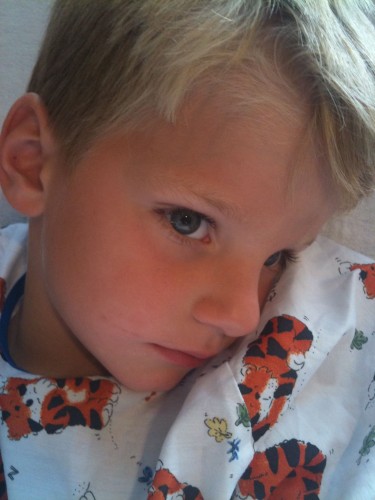 Whit had minor surgery two weeks ago. Everything went great, though he did have to go under general anesthesia which was not a picnic for the mother who was holding him in her arms when he went under. I don’t really recommend that. Otherwise, he is fine, and we are both relieved it’s over.
Whit had minor surgery two weeks ago. Everything went great, though he did have to go under general anesthesia which was not a picnic for the mother who was holding him in her arms when he went under. I don’t really recommend that. Otherwise, he is fine, and we are both relieved it’s over.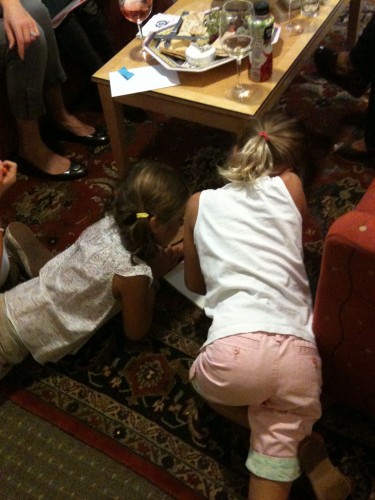 Grace and I had mother-daughter bookclub again, where we read a version of the Princess and the Pea. The book made me really thoughtful about what love is, what we all really want from relationships, and how we deal with difference.
Grace and I had mother-daughter bookclub again, where we read a version of the Princess and the Pea. The book made me really thoughtful about what love is, what we all really want from relationships, and how we deal with difference.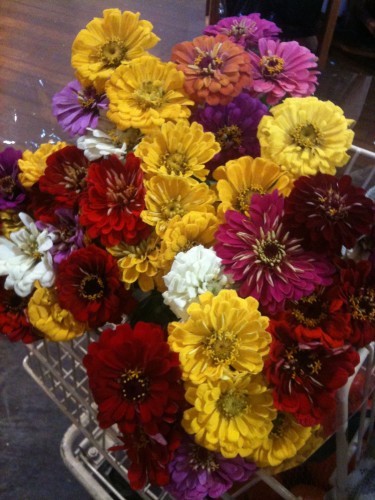 I bought several bunches of zinnias to cheer myself up (and to think of you, Hadley!)
I bought several bunches of zinnias to cheer myself up (and to think of you, Hadley!)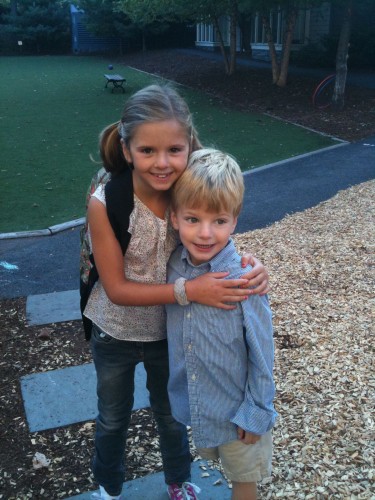 I remembered Picture Day this year, and managed to get both kids to school with hair brushed and non-stained tee-shirts on. Victory. And an improvement over last year.
I remembered Picture Day this year, and managed to get both kids to school with hair brushed and non-stained tee-shirts on. Victory. And an improvement over last year.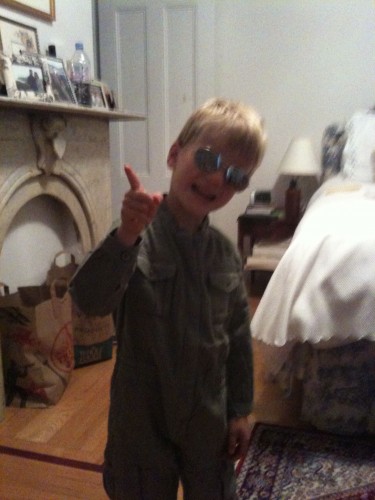 Whit is being Maverick from Top Gun for Halloween. His favorite move these days is to cock his finger like a gun, point it at you, and cluck, as though to say “right on, lady.” He has been doing this for a while, before I decided this was the perfect costume for him. He’s way into it though is insisting that he carry a gun (reinforcing my dislike of Halloween, which I sometimes feel is a holiday that is an excuse for women to dress like prostitutes and for boys to arm themselves). See, I told you he was fine.
Whit is being Maverick from Top Gun for Halloween. His favorite move these days is to cock his finger like a gun, point it at you, and cluck, as though to say “right on, lady.” He has been doing this for a while, before I decided this was the perfect costume for him. He’s way into it though is insisting that he carry a gun (reinforcing my dislike of Halloween, which I sometimes feel is a holiday that is an excuse for women to dress like prostitutes and for boys to arm themselves). See, I told you he was fine.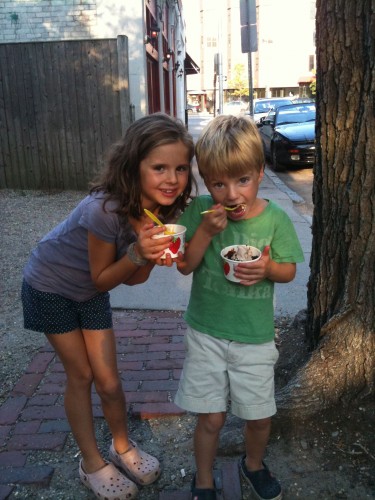 One day this week was stunningly beautiful, and warm, and I surprised the kids by taking them for a walk after an early dinner to the ice cream store and then to two playgrounds. I’m trying to remember to be the mother who says yes, at least some of the time.
One day this week was stunningly beautiful, and warm, and I surprised the kids by taking them for a walk after an early dinner to the ice cream store and then to two playgrounds. I’m trying to remember to be the mother who says yes, at least some of the time.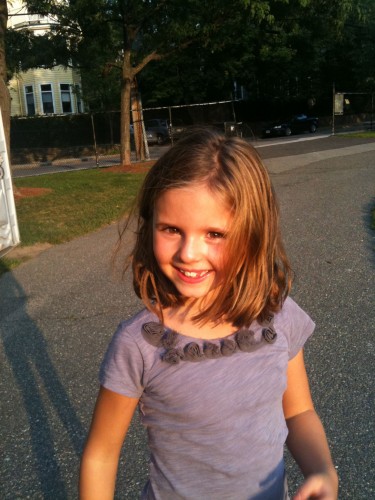 This one? Overnight, a tween. Second grade, so far, is not my friend. Lots of eye rolling, sighing, and shutting of doors. This is starting already? I am not ready.
This one? Overnight, a tween. Second grade, so far, is not my friend. Lots of eye rolling, sighing, and shutting of doors. This is starting already? I am not ready.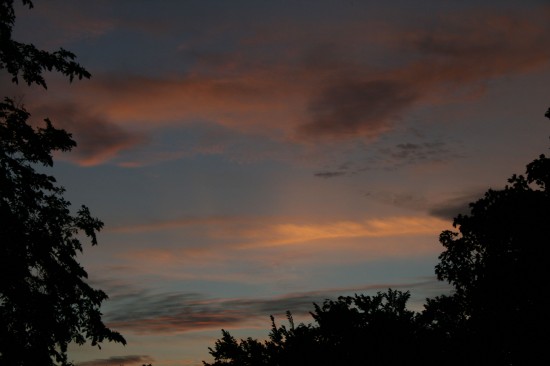 Last night’s sunset, from my office window. There is so much that is stunning about this season, yet it remains ineffably sad to me. There is an elegy in the air every single day. As Jo calls it, this season is the dying one, and I deeply aware of that. This is the final, flaming-out beauty of the natural world on the way to death and hibernation, and I see its incandescent beauty through the lens of that loss. Another year turning to its close.
Last night’s sunset, from my office window. There is so much that is stunning about this season, yet it remains ineffably sad to me. There is an elegy in the air every single day. As Jo calls it, this season is the dying one, and I deeply aware of that. This is the final, flaming-out beauty of the natural world on the way to death and hibernation, and I see its incandescent beauty through the lens of that loss. Another year turning to its close.